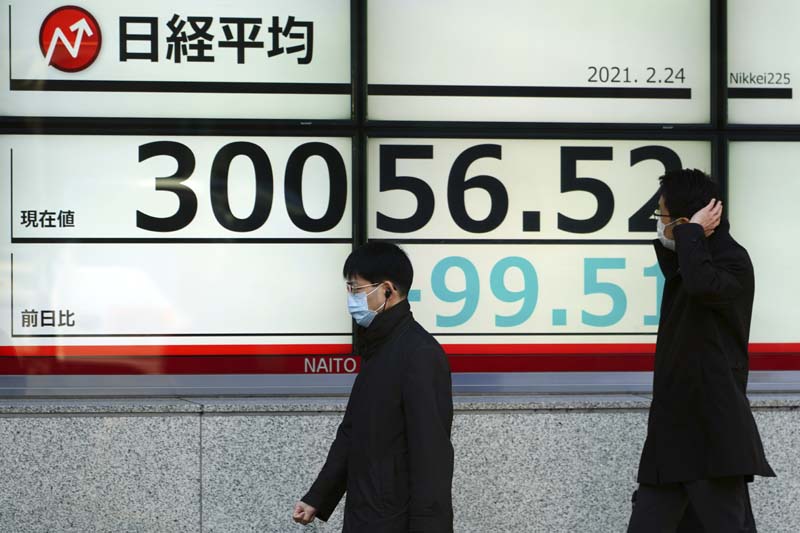

Shares fell on Wednesday in Asia as investors weighed the possibility that inflation might prompt central banks to adjust their ultra-low interest rate policies.
Hong Kong led the decline, losing 2% to 30,015.49. Tokyo’s Nikkei 225 shed 0.8% to 29,923.82, In Seoul, the Kospi edged 0.2% lower, to 3,065.56. Australia’s S&P/ASX 200 lost 0.9% to 6,778.40. The Shanghai Composite index gave up 1.1% to 3,596.04.
Investors remain increasingly focused on a big tick up in bond yields and how it affects stock valuations.
The large amount of stimulus being pumped into economies has been a factor in pushing bond yields higher, giving some investors pause as it revives worries about inflation that have been nearly nonexistent for more than a decade.
The yield on the 10-year Treasury note, which has climbed recently, was steady at 1.34% on Wednesday.
When bond yields rise, stock prices tend to be negatively impacted because investors turn an increasingly larger portion of their money toward the steadier stream of income that bonds provide.
Federal Reserve Chair Jay Powell told Congress on Tuesday the Fed didn’t see a need to alter its policy of keeping interest rates ultra-low, noting that the economic recovery “remains uneven and far from complete.”
The message seemed to be muted in Asia.
“Rising borrowing costs remain the prevalent issue on hand though Fed Powell’s dovish remarks had helped to arrest the fall for US equities on Tuesday,” Jingyi Pan of IG said in a commentary.
However, “Despite reassuring comments on lower rates from the US Federal Reserve chair Jerome Powell, Asia markets continued to look to concerns with regards to the rising bond yields,” Pan said.
A late-afternoon burst of buying on Wall Street on Tuesday helped reverse most of a tech-focused sell-off, nudging the S&P 500 to its first gain after a five-day losing streak.
The benchmark index eked out a 0.1% gain, to 3,881.37. The Dow Jones Industrial Average also rose 0.1%, to 31,537.35. The Nasdaq lost 0.5% to 13,465.20. The indexes were at all-time highs less than two weeks ago.
Smaller company stocks fell more than the broader market. The Russell 2000 small-cap index slid 0.9%, to 2,231.21. The index, the biggest gainer so far this year, clawed back from a 3.6% slide.
The wave of selling in Big Tech stocks nearly reversed entirely as traders seized the opportunity to pick up cheaper shares in Apple, Microsoft, Amazon and other big gainers over the past year at a more attractive price. Tesla, which joined the S&P 500 at the end of last year, ended 2.2% lower after being down as much as 13.4%.
Since the pandemic began, investors consistently pushed the prices of Big Tech stocks to stratospheric heights, betting that quarantined consumers would do most of their shopping online and spend more on devices and services for entertainment.
The bet mostly paid off, as big tech companies reported big profits last year. But the pandemic may be reaching its end stages, with millions of vaccines being administered each week in the US and across the globe now. It may cause consumers to return to their pre-pandemic habits.
More broadly, investors remain focused on the future of global economies badly hit by COVID-19 and the potential for more stimulus to fix them. The US House of Representatives is likely to vote on President Joe Biden’s proposed stimulus package by the end of the week. It would include $1,400 checks to most Americans, additional payments for children, and billions of dollars in aid to state and local governments as well as additional aid to businesses impacted by the pandemic.
In other trading, US benchmark crude oil lost 52 cents to $61.15 per barrel in electronic trading on the New York Mercantile Exchange. It lost 3 cents on Tuesday to $61.67 per barrel. Brent crude, the international standard, lost 39 cents to $64.09 per barrel.
The US dollar rose to 105.44 Japanese yen from 105.24 yen late Tuesday. The euro climbed to $1.2158 from $1.2150.